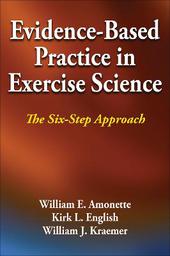
|
Evidence-Based Practice in Exercise Science: The Six-Step Approach
Hardback
Main Details
| Title |
Evidence-Based Practice in Exercise Science: The Six-Step Approach
|
| Authors and Contributors |
By (author) William E. Amonette
|
|
By (author) Kirk L. English
|
|
By (author) William J. Kraemer
|
| Physical Properties |
| Format:Hardback | | Pages:344 | | Dimensions(mm): Height 254,Width 178 |
|
| Category/Genre | Physiology
General
Sports training and coaching |
|---|
| ISBN/Barcode |
9781450434195
|
| Classifications | Dewey:612.044 |
|---|
| Audience | | Postgraduate, Research & Scholarly | | Professional & Vocational | |
|---|
| Illustrations |
6 Halftones, black and white; 52 Illustrations, black and white
|
|
Publishing Details |
| Publisher |
Human Kinetics Publishers
|
| Imprint |
Human Kinetics
|
| Publication Date |
2 March 2016 |
| Publication Country |
United States
|
Description
Exercise science practitioners have access to a vast amount of research findings, expert opinions, novel techniques and programme plans and must sift through this information and retain only the best to form a sound base of knowledge. Evidence-Based Practice in Exercise Science equips readers with the basic skills and competencies for discerning the value of scientific research. Using a methodical approach, students and professionals will learn to identify appropriate evidence to support novel interventions and avoid counterproductive or dangerous information to eliminate ineffective exercise options.
Author Biography
William E. Amonette, PhD, is an assistant professor and director of the exercise and health sciences program in the Department of Clinical Health and Applied Sciences at the University of Houston - Clear Lake. Prior to becoming an academician, Amonette served as an assistant strength and conditioning coach for the Chinese national basketball team at the Beijing Olympic Training Center. He was also previously the assistant strength and conditioning coach and rehabilitation coordinator for the NBA's Houston Rockets, an astronaut strength, conditioning, and rehabilitation specialist, an exercise physiologist, and an integrated testing specialist for the Countermeasures Evaluation and Validation Project for Wyle Laboratories at NASA-Johnson Space Center. Amonette earned his PhD at the University of Texas Medical Branch in rehabilitation sciences, with a research emphasis in clinical exercise physiology. He is a certified strength and conditioning specialist (CSCS) though the National Strength and Conditioning Association, an Associate Editor for the Journal of Strength and Conditioning Research, and ad hoc peer-reviewer for many scientific journals related to exercise and sport science. Amonette's research interests include physiological and mechanical predictors of sports performance and injury. He also has clinical research interest in neuroendocrine and metabolic responses to exercise in patients with traumatic brain injuries and the effect of novel exercise interventions on rehabilitation outcomes in people with disabilities. He has published numerous scientific and academic peer-reviewed journal articles, reports, and book chapters and has presented his work nationally and internationally. Kirk L. English, PhD, is a senior scientist with JES Tech LLC, a NASA contractor, and works in the Exercise Physiology and Countermeasures Laboratory at NASA - Johnson Space Center. He is also a research scientist in the Department of Nutrition and Metabolism at the University of Texas Medical Branch (UTMB) and an adjunct professor at the University of Houston - Clear Lake, where he teaches a graduate course. English, who is a member of the National Strength and Conditioning Association, American College of Sports Medicine, and American Physiological Society, received his PhD in rehabilitation sciences from UTMB. During his graduate studies, he was awarded a competitive three-year NASA/Texas Space Grant Consortium Graduate Fellowship. English has published numerous peer-reviewed articles, technical reports, conference abstracts, and book chapters on exercise, nutrition, aging, spaceflight, and evidence-based practice in the field of exercise science. In his work with NASA, English's research focuses on the prevention of spaceflight-induced decreases in skeletal muscle mass, strength, and performance. His work includes the development and validation of novel exercise protocols and hardware that are used both on the ground and during spaceflight. He also conducts all pre- and post-flight strength testing of American, European, Canadian, and Japanese International Space Station crewmembers and serves as the liaison and subject matter expert on this topic to NASA's international partners. William J. Kraemer, PhD, is a full professor in the Department of Human Sciences at The Ohio State University. He has also held full professorships at the University of Connecticut, Ball State University, and The Pennsylvania State University, including each medical school. Dr. Kraemer is a fellow of the American College of Sports Medicine, the National Strength and Conditioning Association (NSCA), and the American College of Nutrition. Among many of his professional achievements, he is a recipient of the NSCA's Lifetime Achievement Award. He is editor in chief of the NSCA's Journal of Strength and Conditioning Research, an editor of the European Journal of Applied Physiology, and an associate editor of the Journal of the American College of Nutrition. He holds many other editorial board positions in the field. Kraemer has published more than 450 peer-reviewed papers in scientific literature and has published 12 books. He received the 2014 Expertscape Award, which named him the nation's top expert in resistance training research over the past ten years. With almost 40,000 citations on Harzing's Publish or Perish lists, his scholarly impact is impressive.
|